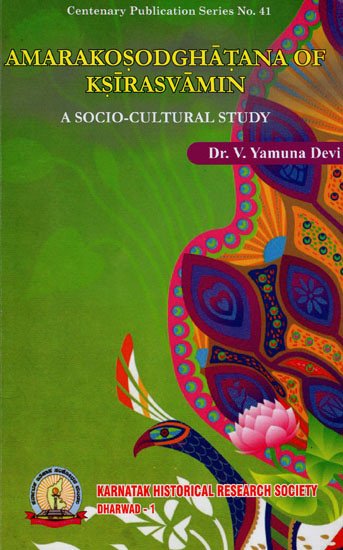Amarakoshodghatana of Kshirasvamin (study)
by A. Yamuna Devi | 2012 | 77,297 words | ISBN-13: 9788193658048
This page relates ‘Flora (8): Herbs’ of the study on the Amarakoshodghatana of Kshirasvamin (in English) which represents a commentary on the Amarakosha of Amarasimha. These ancient texts belong the Kosha or “lexicography” category of Sanskrit literature which deals with the analysis and meaning of technical words from a variety of subjects, such as cosmology, anatomy, medicine, hygiene. The Amarakosa itself is one of the earliest of such text, dating from the 6th century A.D., while the Amarakoshodghatana is the earliest known commentary on that work.
Flora (8): Herbs
(a) Ajamodā (II. 4. 145; p. 117):
Amarakośa mentions ajamodā, ugragandhā brahmadarbhā and yavānikā as synonyms. Kṣīrasvāmin suggests that the word must be yamāni interpreting “it as that which causes indigestion”. Also he points out that ajamodā, is quite different from yavāni and quotes Dhanvantari Nighaṇṭu (II. 91).
Though they are phonetically similar one should not be mistaken for the other and remarks that Amarasiṃha’s reading of both the words as synonyms is erroneous–
yacchatyagnimāndyaṃ yamānī pūrvoktāpīha śākatvāt punaru ktā yavānīṃ matvā vā granthakṛd bhrāntaḥ |
āha ca—
yavānī dīpyako dīpyo yavasāhvaya nāmakaḥ yamānikogragandho ca dīpanīyā ca dīpanī |
pūrvo ktā hi kharāśvaivājamodā brahmakuśā ca |
tathā cenvaidyāḥ—
ājamodā brahmakuśā kharāśvā locamarkaṭaḥ |
vallīmodā vastamodā saiva hastimayūrakaḥ |
The Ayurvedic physicians[1] also endorse that ajamodā and yavāni are different herbs. They also suggest that both these plants and their fruits are similar in appearance but ajamodā is not as pungent as yavāni.
(b) Gojihvā (II. 4. 120; p. 111):
Gojihvā also called dārvikā is said to cure many diseases. Kṣīrasvāmin observes this to be a variety of Oṣadhi–
dārayati rogān dārvī oṣadhiviśeṣaḥ |
Footnotes and references:
[1]:
Dravyaguṇavijñāna, p. 266
